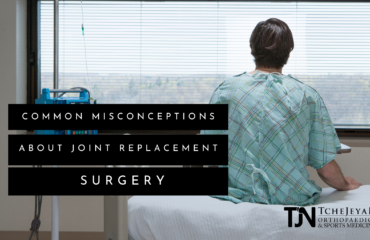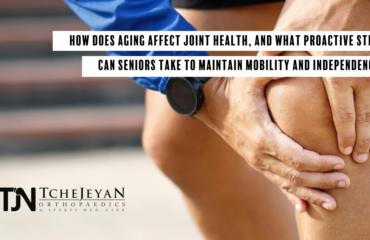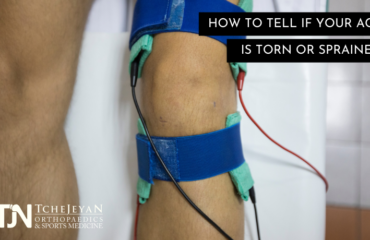When cartilage in the knee is damaged – whether from a sudden injury, long-term wear and tear, or degeneration – it can cause pain, swelling, and stiffness, as well as other ongoing problems. Here at Tchejeyan Orthopaedics & Sports Medicine in Thousand Oaks, California, our team of orthopedic specialists strive to provide the most effective care available for patients with knee problems, including damaged cartilage.
There are two types of cartilage in the knee: articular cartilage and the meniscus. Articular cartilage covers the ends of the bones in the knee: the femur (thigh bone), the tibia (shin bone), and the patella (knee cap). The articular cartilage provides a smooth surface for the bones to move back and forth without friction. The meniscus is a layer of fibrocartilage that provides shock absorption between the femur and tibia. This extra layer of cartilage is critical, as the knee joint bears most of the body’s weight as well as the weight of impact from activities like running and jumping.
Symptoms of Damaged Cartilage
When cartilage in the knee is damaged or degenerates, it ceases to perform its primary functions of providing shock absorption or fluid movement. Tears in the cartilage can allow bone to directly contact bone whenever there is movement, causing pain, swelling, stiffness, and locking up of the knee. Sometimes the pain from cartilage damage can build up gradually over time, but it can also come on quickly as the result of a traumatic injury.
The pain may be present only when using the knee, although some patients also experience discomfort while the knee is resting. It is not unusual for the knee to be stiff and painful after getting up to move. The pain may be worse when weight or stress is put on the knee, such as when you walk up or down stairs. With traumatic events, the swelling may occur in the days following the injury, and it may be hard to bend the knee.
While there are instances when very minor cartilage injuries will repair themselves through sufficient rest, the more likely scenario is that treatment will be required to avoid worsening the condition.
When left untreated, damaged knee cartilage will not only cause additional pain, but it can result in serious concerns such as osteoarthritis (OA) or even lead to near-total immobility, given that knees are critical for body movement.
Causes of Damaged Knee Cartilage
Knee injuries can be either acute or chronic. Sudden injuries are commonly sustained in sports activities, often when pivoting, stopping suddenly, or landing on the knee at an odd angle. Overuse is also a common cause. Not only athletes, but people with physically active jobs such as construction workers or delivery drivers, who engage in repeated movements, may end up sustaining a cartilage injury from overuse. Cartilage damage can also be the result of degenerative diseases, like arthritis. In other cases, it can be a lack of use that destroys cartilage, as joints require regular movement in order to stay lubricated and healthy.
Treating the Injury
At Tchejeyan Orthopaedics & Sports Medicine, we try to tailor our methods of treatment to the particular injury, and we specialize in assisting patients who engage in active lifestyles, such as athletes. Consistent with this perspective, we employ, when possible, minimally-invasive surgical treatments to get people back into action as quickly – and as safely – as possible. Thankfully, many cartilage injuries, such as repairing a torn meniscus or surgeries to trim or remove damaged cartilage can be done arthroscopically.
In cases of severe injury, however, we may have to consider joint reconstruction surgery. When cartilage damage has been left untreated, cartilage damage can result in damage to the bones and other tissues in the knee. In these cases, a total knee replacement may be warranted.
Total knee replacement involves replacing the entire joint with metal and plastic prosthetic devices. Although these invasive procedures entail a fairly long recovery time, it can still be performed as an outpatient procedure. It affords patients almost immediate pain relief from the damage, although patients will experience pain from the surgery itself. With time and physical therapy, patients can expect to regain full functionality, and the prosthesis can last up to twenty years.
Dr. Tchejeyan, along with his team at Tchejeyan Orthopaedics & Sports Medicine, has been voted outstanding orthopedic surgeon in the Greater Los Angeles area. To get started on your healing journey to relieve your knee pain, contact TJN Ortho today.




